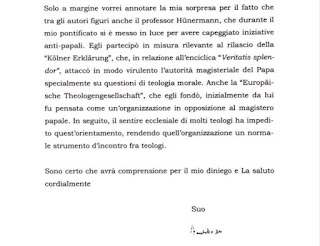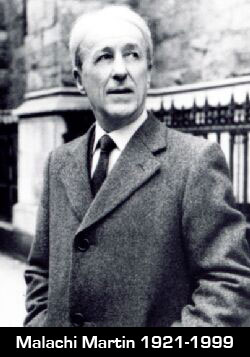VIGANÒ AI VESCOVI DEL SUMMIT: CHIEDETE CHIAREZZA SU NOMINE E OMOSESSUALITÀ. SENZA PAURA. ENGLISH TEXT TOO.
16 Febbraio 2019
Marco Tosatti
Cari amici
di Stilum Curiae, il National Catholic Register ha organizzato un
Simposium in tema di vertice sugli abusi, il vertice che si svolgerà la
settimana prossima a Roma. Ha contribuito con un suo testo l’arcivescovo
Carlo Maria Viganò, che vi offriamo nella nostra
traduzione. In calce trovate il testo in inglese.
Grazie per
avermi invitato a partecipare a questo simposio su “Abuso e via di
guarigione” in previsione del prossimo Vertice dei vescovi in
Vaticano. Il mio contributo attingerà alla mia esperienza personale di
51 anni di sacerdozio.
È evidente a tutti che una causa primaria dell’attuale terribile
crisi di abusi sessuali commessa dal clero ordinato, inclusi i vescovi, è
la mancanza di un’adeguata formazione spirituale dei candidati al
sacerdozio. Questa mancanza, a sua volta, è ampiamente spiegata dalla
corruzione dottrinale e morale di molti formatori dei seminari, una
corruzione che è aumentata esponenzialmente a partire dagli anni ’60.Sono entrato in un seminario pontificio a Roma e ho iniziato i miei studi all’Università Gregoriana quando avevo 25 anni. Era il 1965, pochi mesi prima della fine del Vaticano II. Non potei fare a meno di notare, non solo nel mio stesso collegio, ma anche in molti altri a Roma, che alcuni seminaristi erano molto immaturi e che queste case di formazione erano segnate da una generale e molto seria mancanza di disciplina.
Alcuni esempi saranno sufficienti. A volte i seminaristi passavano la notte fuori dal mio seminario, poiché la supervisione era tristemente inadeguata. Il nostro direttore spirituale era favorevole all’ordinazione sacerdotale ad tempus – l’idea che il sacerdozio ordinato potesse essere uno status meramente temporaneo.
Alla Gregoriana, uno dei professori di teologia morale favoriva l’etica della situazione. E alcuni compagni di classe mi confidarono che i loro direttori spirituali non avevano obiezioni al fatto che si presentassero all’ordinazione sacerdotale, nonostante i loro peccati irrisolti e continui gravi contro la castità.
Certamente, coloro che soffrono di un’attrazione dello stesso sesso profondamente radicata non dovrebbero mai essere ammessi al seminario. Inoltre, prima che qualsiasi seminarista sia accettato per l’ordinazione, egli non deve solo cercare la castità, ma realmente realizzarla. Egli deve già vivere casto il celibato pacificamente e per un periodo di tempo prolungato, perché se questo manca, il seminarista e i suoi formatori non possono avere la necessaria sicurezza che sia chiamato alla vita celibe.
I vescovi hanno la responsabilità fondamentale della formazione dei loro candidati al sacerdozio. Qualsiasi vescovo che abbia coperto abuso o seduzione di minori, adulti vulnerabili o adulti sotto la cura pastorale di un sacerdote, inclusi i seminaristi, non è adatto a tale responsabilità o per qualsiasi ministero episcopale e dovrebbe essere rimosso dal suo ufficio.
Prego intensamente per il successo del vertice di febbraio. Sebbene mi rallegrerei molto se il vertice avesse successo, le seguenti questioni rivelano che non vi è alcun segno di una genuina disponibilità ad affrontare le vere cause della situazione attuale:
Perché l’incontro si concentrerà esclusivamente sull’abuso di minori? Questi crimini sono davvero i più orribili, ma le crisi negli Stati Uniti e in Cile che hanno in gran parte accelerato il prossimo vertice riguardano gli abusi commessi contro giovani adulti, inclusi i seminaristi, non solo contro i minori. Quasi nulla è stato detto sulla cattiva condotta sessuale verso gli adulti, che è essa stessa un grave abuso di autorità pastorale, indipendentemente dal fatto che la relazione fosse “consensuale” o meno.
Perché la parola “omosessualità” non compare mai nei recenti documenti ufficiali della Santa Sede? Questo non significa affatto che la maggior parte di coloro che hanno una inclinazione omosessuale siano abusatori, ma resta il fatto che la stragrande maggioranza degli abusi è stata inflitta a ragazzi post-puberali da chierici omosessuali. È pura ipocrisia condannare l’abuso e pretendere di simpatizzare con le vittime senza affrontare onestamente questo fatto. È necessaria una rivitalizzazione spirituale del clero, ma alla fine sarà inefficace se non affronterà questo problema.
Perché Papa Francesco mantiene e chiama addirittura come suoi stretti collaboratori persone che sono notoriamente omosessuali? Perché si è rifiutato di rispondere a domande legittime e sincere su queste nomine? In tal modo ha perso credibilità sulla sua reale volontà di riformare la Curia e combattere la corruzione.
Nella mia terza testimonianza, ho pregato il Santo Padre di far fronte agli impegni che egli stesso ha assunto assumendo il suo ufficio come Successore di Pietro. Ho fatto notare che si è assunto la missione di confermare i suoi fratelli e guidare tutte le anime nel seguire Cristo lungo la via della croce. L’ho esortato allora, e ora lo esorto di nuovo, a dire il vero, a ravvedersi, a mostrare la sua disponibilità a seguire il mandato dato a Pietro e, una volta convertito, a confermare i suoi fratelli (Luca 22:32).
Prego che i vescovi riuniti a Roma ricordino lo Spirito Santo, che hanno ricevuto con l’imposizione delle mani, e si facciano carico della loro responsabilità di rappresentare le loro Chiese particolari chiedendo fermamente, e insistendo, una risposta alle domande di cui sopra durante il vertice.
Anzi, prego che non tornino nei loro paesi senza risposte adeguate a queste domande, perché fallire su questo punto significherebbe abbandonare il proprio gregge ai lupi e permettere a tutta la Chiesa di subire conseguenze terribili.
Nonostante i problemi che ho descritto, continuo ad avere speranza, perché il Signore non abbandonerà mai la sua Chiesa.
Thank you for inviting me to take part in this symposium on “Abuse and the Way to Healing” in anticipation of the upcoming bishops’ summit at the Vatican. My contribution will draw on my personal experience of 51 years of priesthood.
It is evident to all that a primary cause of the present terrible crisis of sexual abuse committed by ordained clergy, including bishops, is the lack of proper spiritual formation of candidates to the priesthood. That lack, in turn, is largely explained by the doctrinal and moral corruption of many seminary formators, corruption that increased exponentially beginning in the 1960s.
I entered a pontifical seminary in Rome and began my studies at the Gregorian University when I was 25 years old. It was 1965, just months before the end of Vatican II. I couldn’t help but notice, not only in my own college but also in many others in Rome, that some seminarians were very immature and that these houses of formation were marked by a general and very serious lack of discipline.
A few examples will suffice. Seminarians sometimes spent the night outside my seminary, as the supervision was woefully inadequate. Our spiritual director was in favor of priestly ordination ad tempus — the idea that ordained priesthood could be a merely temporary status.
At the Gregorian, one of the professors of moral theology favored situation ethics. And some classmates confided to me that their spiritual directors had no objection to their presenting themselves for priestly ordination despite their unresolved and continual grave sins against chastity.
Certainly, those who suffer from deep-seated same-sex attraction should never be admitted to seminary. Moreover, before any seminarian is accepted for ordination, he must not only strive for chastity but actually achieve it. He must already be living chaste celibacy peacefully and for a prolonged period of time, for if this is lacking, the seminarian and his formators cannot have the requisite confidence that he is called to the celibate life.
Bishops have the paramount responsibility for the formation of their candidates to the priesthood. Any bishop who has covered up abuse or seduction of minors, vulnerable adults or adults under a priest’s pastoral care, including seminarians, is not fit for that responsibility or for any episcopal ministry and should be removed from his office.
I am praying intensely for the success of the February summit. Although I would rejoice greatly if the summit were successful, the following questions reveal that there is no sign of a genuine willingness to attend to the real causes of the present situation:
Why will the meeting focus exclusively on the abuse of minors? These crimes are indeed the most horrific, but the crises in the United States and Chile that have largely precipitated the upcoming summit have to do with abuses committed against young adults, including seminarians, not only against minors. Almost nothing has been said about sexual misconduct with adults, which is itself a grave abuse of pastoral authority, whether or not the relationship was “consensual.”
Why does the word “homosexuality” never appear in recent official documents of the Holy See? This is by no means to suggest that most of those with a homosexual inclination are abusers, but the fact remains that the overwhelming majority of abuse has been inflicted on post-pubescent boys by homosexual clerics. It is mere hypocrisy to condemn the abuse and claim to sympathize with the victims without facing up to this fact honestly. A spiritual revitalization of the clergy is necessary, but it will be ultimately ineffectual if it does not address this problem.
Why does Pope Francis keep and even call as his close collaborators people who are notorious homosexuals? Why has he refused to answer legitimate and sincere questions about these appointments? In doing so he has lost credibility on his real will to reform the Curia and fight the corruption.
In my third testimony, I begged the Holy Father to face up to the commitments he himself made in assuming his office as Successor of Peter. I pointed out that he took upon himself the mission of confirming his brothers and guiding all souls in following Christ along the way of the cross. I urged him then, and I now urge him again, to tell the truth, repent, show his willingness to follow the mandate given to Peter and, once converted, to confirm his brothers (Luke 22:32).
I pray that the bishops gathered in Rome will remember the Holy Spirit, whom they received with the imposition of hands, and carry out their responsibility to represent their particular Churches by firmly asking for, and insisting on, an answer to the above questions during the summit.
Indeed, I pray that they will not return to their countries without proper answers to these questions, for to fail in this regard would mean abandoning their own flocks to the wolves and allowing the entire Church to suffer dreadful consequences.
Despite the problems I have described, I continue to have hope, because the Lord will never abandon his Church.



Commenti
Posta un commento